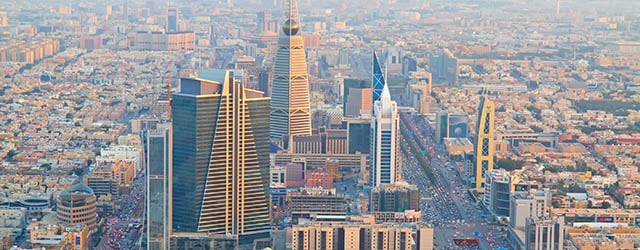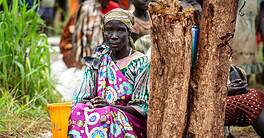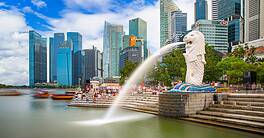Sparkling office towers won’t draw business without the right policies.

Governments of the six-member Gulf Cooperation Council (GCC) are reacting to the collapse in oil prices in varying degrees, but none can return to the status quo ante of handouts and expensive state-backed subsidies. For years the GCC has lavished billions of dollars on projects, many of which turned out to be white elephants. Perhaps the most vivid example is the 59 mostly empty towers of King Abdullah Financial District in the Saudi Arabian capital, Riyadh. Reportedly costing $7.8 billion, with floor space of more than 3 million square meters, the project is bereft of the investment bankers it sought to attract.
For many, the project symbolizes the latent disconnect between the Gulf’s tendency to spend billions on grandiose infrastructure yet overlook the equally important “soft” infrastructure of regulation, governance and human capital. There are, however, exceptions. The Dubai International Financial Centre, which Riyadh was trying to emulate, has managed to set itself apart from other regional competitors and is noted for the quality of its regulation and transparency embedded in a tax-free zone.
Although GCC countries have begun to implement fiscal reforms, there is more to be done, according to Michael Armstrong, regional director for accounting body ICAEW in the Middle East, Africa and South Asia: “In order to get greater buy-in from the private sector and attract foreign investors, there must be more structural reforms, which [would] include initiatives like 100 percent foreign ownership, long-term residency, investment frameworks, PPP [public-private partnerships] frameworks, and improved transparency and corporate governance.”
NO LONGER PLANES, TRAINS AND AUTOMOBILES
Armstrong argues that such reforms are crucial if the GCC is to build and retain human capital. The region’s bellwether, Saudi Arabia, has announced an ambitious plan—“Vision 2030”—to transform its hydrocarbon-dependent economy. It is a radical departure from the kingdom’s closed, protectionist environment, but its architect, deputy crown prince Mohammad bin Salman, appears determined to press ahead with a wave of privatizations and boost foreign investment. Yet Saudi Arabia is infamous for the restrictions it places on expatriate labor, and unless it liberalizes them significantly, analysts say, such a radical plan can scarcely be implemented.
A recent ICAEW roundtable estimated that 130 million new jobs need to be created by 2020 if the region is to stave off further extremism and poverty. The GCC faces multiple challenges; to attract foreign investors and build a thriving economy, labor mobility is essential. Without exception, GCC states are burning through foreign exchange reserves accumulated when oil prices were in excess of $100 a barrel. Kai Chan, distinguished fellow at graduate business school INSEAD Abu Dhabi, argues it is not just about labor economics: The GCC must also tackle deficiencies in the education system. “The GCC has a considerable lag, especially relative to its economic development and its level of physical capital (especially infrastructure),” he says. “Data from GMAT, OECD and other testing agencies show a big gap; the region is not globally competitive in educational achievement.”
Chan also believes the GCC is not harnessing the experience of its expatriate workforce to full effect. “The expat community serves as a great way to pass on knowledge and further develop the human capital of the region. However, the short-term/temporary nature of expat postings limits the ability of knowledge and human capital to develop amongst the locals,” he says. “This is because expats who do not see themselves rooted in the region often will not expend energy to train or pass on knowledge.”
Bureaucracy is another dragging anchor. At the moment, GCC economies languish in global rankings. The World Bank ranked the United Arab Emirates 31 out of 189 for ease of doing business—the most competitive GCC ranking yet—in contrast to Kuwait at 101 and the Gulf’s largest economy, Saudi Arabia, at 82. It is in the legal domain where most GCC economies lag global standards, and that is inhibiting greater foreign investment. Analysts cite the lack of bankruptcy protection and the inability to trade across borders as the biggest impediments. In the financial services sector all GCC markets have their own stock markets, which complicates decision-making for institutional investors. Still, the UAE and Qatar were upgraded to emerging markets status by MSCI, a provider of stock market and other indexes, in 2014, and have seen a moderate increase in fund flows.
Saudi Arabia’s decision, also in 2014, to open up access to its stock market, the Tadawul, received a tepid response as the granting of qualified foreign investor status is restricted to investors with at least 18,750,000 Saudi Arabian riyals (approximately $5 billion) in assets under management—although the Capital Markets Authority has discretion to reduce the figure in some circumstances. Saudi Arabia remains a frontier market, but investors are hopeful it will be upgraded. The fact it was not upgraded before, despite having the region’s largest market capitalization by far, reflects lingering concerns over governance and transparency.
The CMA has taken steps to improve oversight and boost enforcement, which may allay concerns flagged by MSCI. In a report published in May, the credit rating agency Moody’s credited Saudi Arabia for progress but expressed continuing concerns: “Saudi Arabia is perceived as the most difficult place to do business among GCC countries. While certain regulations and procedures are being simplified, the state bureaucracy contributes to the unpredictability of the regulatory framework.”
FUTURE UNKNOWN
On several measures GCC states lack critical mass, but the intensifying pressure on domestic economies could force deeper integration within the six-member bloc. After all, there has been coordination over the introduction of a 5% VAT (value-added tax) throughout the GCC by 2018. But beyond superficial gestures, the GCC’s history suggests that closer coordination—at least at the economic level—remains a distant prospect. Almost certainly the pace of reform and economic liberalization will vary between states, and increasingly investors will judge the GCC as a two-tier opportunity. Relatively dynamic economies like the UAE will continue to attract investment flows, while laggards such as Kuwait will have to rely on other methods to diversify their economies.
Even in the UAE, the scope for more deregulation and further opening up of the economy will test the resolve of policymakers. The degree to which they resist change or are forced to capitulate still probably depends on the price of oil. In the Gulf, change is far from assured, and that could mean investors will turn their attention elsewhere.



